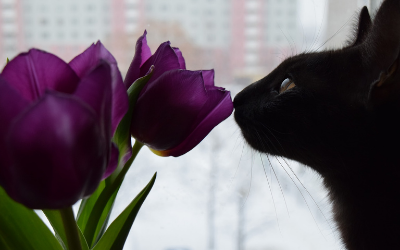
Pet poisoning happens more often than pet owners realize. Many common items found in our homes are toxic to our pets, including plants, alcohol, certain foods, medications, xylitol, and cannabis. Since March is Pet Poison Prevention Month, now is as good a time as any to make sure that your home is “petproofed” and accidental poisonings can be avoided.
Some common items that cause poisonings include:
Plants: Many house plants (and garden plants) can be toxic to both cats and dogs. Lilies from the Lilium and Hemerocallis family (Easter lilies, tiger lilies, and stargazer lilies) are very toxic to cats—even the pollen from these plants can cause kidney failure in cats. Early bloomers like tulips and daffodils can cause toxic effects if you pet decides to go digging in your pots and snacks on the bulbs. Signs can include drooling, loss of appetite, convulsions, and cardiac abnormalities. Take an inventory of the plants you have in your home and garden this spring to be sure your plants are pet safe!
Alcohol: Some dogs can’t resist the smell of cocktails, beer, or wine left unattended on the coffee table and will try to sneak a drink. Alcohol can also be hidden in rum-soaked fruitcake and other baked goods. Unbaked bread and pizza dough left to rise on the counter is another source of alcohol and cause alcohol poisoning very quickly if consumed.
Foods: Grapes, raisins, currants, onions, garlic, and macadamia nuts are all toxic. Ingestion of macadamia nuts may result in severe lethargy, increased body temperature, vomiting, tremors, joint stiffness, and hind limb weakness. Grapes, raisins, and currants are toxic to dogs and there’s anecdotal evidence that they are toxic to cats and ferrets too. Consuming small amounts can result in severe, acute kidney failure. Renal failure can occur days after consumption. Onions, garlic, and other plants in the onion family (chives and leeks) are toxic to cats and dogs (more so to cats). Signs of poisoning include weakness, lethargy and pale mucous membranes due to anemia. Contact your veterinarian if your pet consumes any of these foods.
Medications: Any medication (over-the-counter drugs, prescription drugs, and supplements) can cause toxicity in pets—even drugs prescribed to your pet. Common pain killers like acetaminophen (e.g., Tylenol) and non-steroidal anti-inflammatories (such as Advil, Aleve, Motrin, etc.) are toxic to pets. Be sure to keep ALL medications, including those prescribed to your pets, in locked cabinets or high cupboards.
Xylitol: Xylitol is a natural substance used as a sugar substitute in many products, including gum, candy, mints, packaged baked goods, pudding snacks, peanut butter, and toothpaste. While completely safe for human consumption, xylitol is extremely toxic to dogs and can cause toxic effects within just 10 minutes of ingestion. Signs include weakness, lethargy, incoordination, seizures, and vomiting. Liver failure and death can occur if not treated quickly.
Cannabis: With the legalization of cannabis for both medicinal and recreational use in many areas, accidental consumption of the drug by pets has increased. Because dogs have more cannabinoid receptors in their brains than humans do, the effects of cannabis can be more dramatic and potentially more toxic when compared to humans. Signs of intoxication include disorientation, excessive drooling, lack of coordination, low heart rate, urine leakage, hyperactivity, and pupil dilation. Seek veterinary care if you think your pet has consumed or inhaled cannabis products.
Follow these points to avoid accidental poisonings:
- If you have a cat, keep lilies, and all other potentially toxic plants out of reach – or out of your home and garden altogether.
- Never leave alcoholic beverages unattended, especially on low tables, or anywhere your pets commonly jump up.
- Be aware of foods that can pose a problem and be sure not to feed them to your pet.
- Store medications behind closed doors, in drawers, or anywhere your pets can’t access. Remember to put them away promptly after taking them so your curious pooch doesn’t find them on the counter.
- Store your medications away from your pet’s You don’t ever want to accidentally mix up those bottles.
- Remember your bag – if you carry medication, gum, candy, or fruit snacks, store your purse or laptop bag in a closet when you’re home.
- Keep edibles and other cannabis products in out of reach cabinets or on high shelves.
Remember, just because something is childproof, doesn’t make it petproof! Keep all potential toxins out of reach of pets, including your favorite snacks!